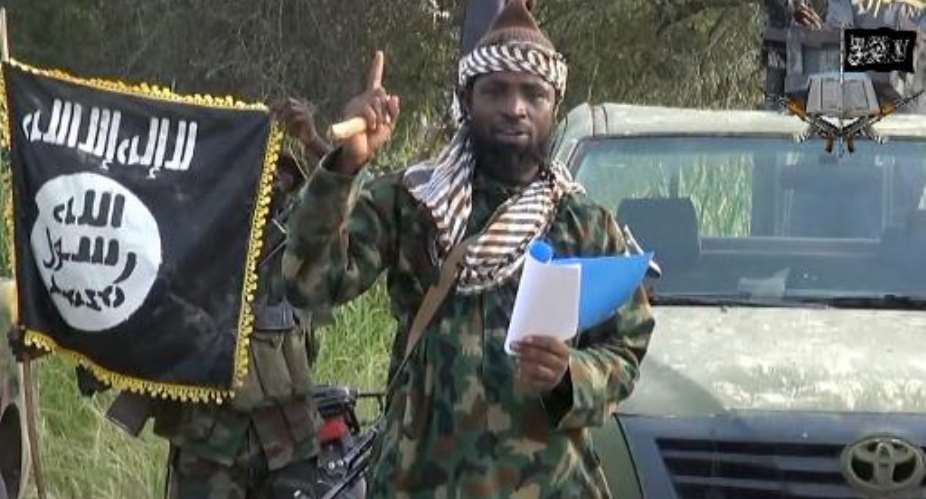Kano (Nigeria) (AFP) - Boko Haram leader Abubakar Shekau is an elusive figure whose whereabouts are unknown, but he makes himself heard each time the military proclaims him dead.
Speculation about the wanted Islamist leader's condition -- and even his true identity -- has been rampant in Nigeria for years.
Some experts and Nigerian security officials insist "Shekau" is a composite character, with different militant fighters stepping into the role at different times.
The military said last week that the latest man posing as Shekau in recent video messages had been killed after fighting with troops in the far northeast.
The original Abubakar Shekau -- the son of poor farmers who became radicalised in a series of theological schools before taking over Boko Haram in 2010 -- actually died months, or possibly several years ago, according to the security services.
But the United States and other experts have questioned the credibility of that claim while Shekau outright rejected it in a new video obtained by AFP on Thursday.
"Here I am, alive. I will only die the day Allah takes my breath," said the insurgent leader, who has been sanctioned by the UN Security Council and declared a "global terrorist" the United States.
He issued a similarly boastful denial in 2013 after the military claimed he may have died from a gunshot wound.
- Mental imbalance? -
The biography of the so-called original Abubakar Muhammad Shekau tells of a young man with a rudimentary grasp of Islamic teaching who became increasingly radicalised.
His parents came from neighbouring Niger and were ethnic Kanuris. They are thought to have migrated south into northeast Nigeria's Yobe state, where Shekau was born.
The young Shekau learned basic Islamic theology, embracing the more hardline Sunni Wahhabist ideology and became a local preacher before moving to the state capital of Borno state, Maiduguri, in 1990.
"He was an easy-going fellow who would exchange banter with people in the neighbourhood. He was popular... as a local theology student," said Grema Kawudima, from the Mafoni area of the city, in a September 2012 interview.
According to another local, Butari Gwoni, Shekau married the daughter of a teacher, but his wife died in childbirth, triggering what some said was latent mental illness.
He began "exhibiting signs of mental imbalance" after his wife's death, said Gwoni.
Foreign observers have also said Shekau displays signs of instability and he does appear unhinged in many of his videos, with wide-eye rantings that celebrate acts of horrific violence.
But John Campbell of the Council on Foreign Relations, a former US ambassador to Nigeria, maintained that Shekau "is not unhinged."
"It is all to effect," he told AFP, arguing that Shekau, in glorifying bloodshed, is playing to the "attraction of extreme violence" among demoralised young men in the northeast who have been chronically neglected by corrupt Nigerian governments.
In a widely cited 2012 quote from one of Shekau's first videos the insurgent leader said: "I enjoy killing...the way I enjoy slaughtering chickens and rams."
- Abrasive, radical -
Shekau's path to radicalisation was forged when he enrolled in a Higher Islamic Studies course at the Borno state College of Legal and Islamic Studies, where he learnt Arabic and theology.
It was there he met Mamman Nur, who would later mastermind the August 2011 bombing of the United Nations headquarters in Abuja, which killed 26 and brought Boko Haram greater global attention.
Nur introduced Shekau to Mohammed Yusuf, Boko Haram's founder, who was killed in 2009 during a military crackdown on the group that left some 800 people dead.
"He (Shekau) was a simple, carefree fellow at the beginning, who was teased by fellow students for his occasional silly behaviour that smacked of mental imbalance," said Kayam Bulama, a student at the same time.
"But soon after Mamman Nur linked him up with Mohammed Yusuf, he began to be abrasive and radical, shunning other students and keeping company of his fellow sect members."
The more radical and violent Shekau is said to have orchestrated the 2009 Boko Haram uprising and after Yusuf's death, he took over, sidelining Nur, who was considered more knowledgeable and level-headed.





 We’ll no longer tolerate your empty, unwarranted attacks – TUC blasts Prof Adei
We’ll no longer tolerate your empty, unwarranted attacks – TUC blasts Prof Adei
 Bawumia donates GHc200,000 to support Madina fire victims
Bawumia donates GHc200,000 to support Madina fire victims
 IMF to disburse US$360million third tranche to Ghana without creditors MoU
IMF to disburse US$360million third tranche to Ghana without creditors MoU
 Truck owner share insights into train collision incident
Truck owner share insights into train collision incident
 Paramount chief of Bassare Traditional Area passes on
Paramount chief of Bassare Traditional Area passes on
 Two teachers in court over alleged illegal possession of BECE papers
Two teachers in court over alleged illegal possession of BECE papers
 Sunyani: Victim allegedly shot by traditional warriors appeals for justice
Sunyani: Victim allegedly shot by traditional warriors appeals for justice
 Mahama vows to scrap teacher licensure exams, review Free SHS policy
Mahama vows to scrap teacher licensure exams, review Free SHS policy
 Government will replace burnt Madina shops with a new three-story, 120-store fac...
Government will replace burnt Madina shops with a new three-story, 120-store fac...
